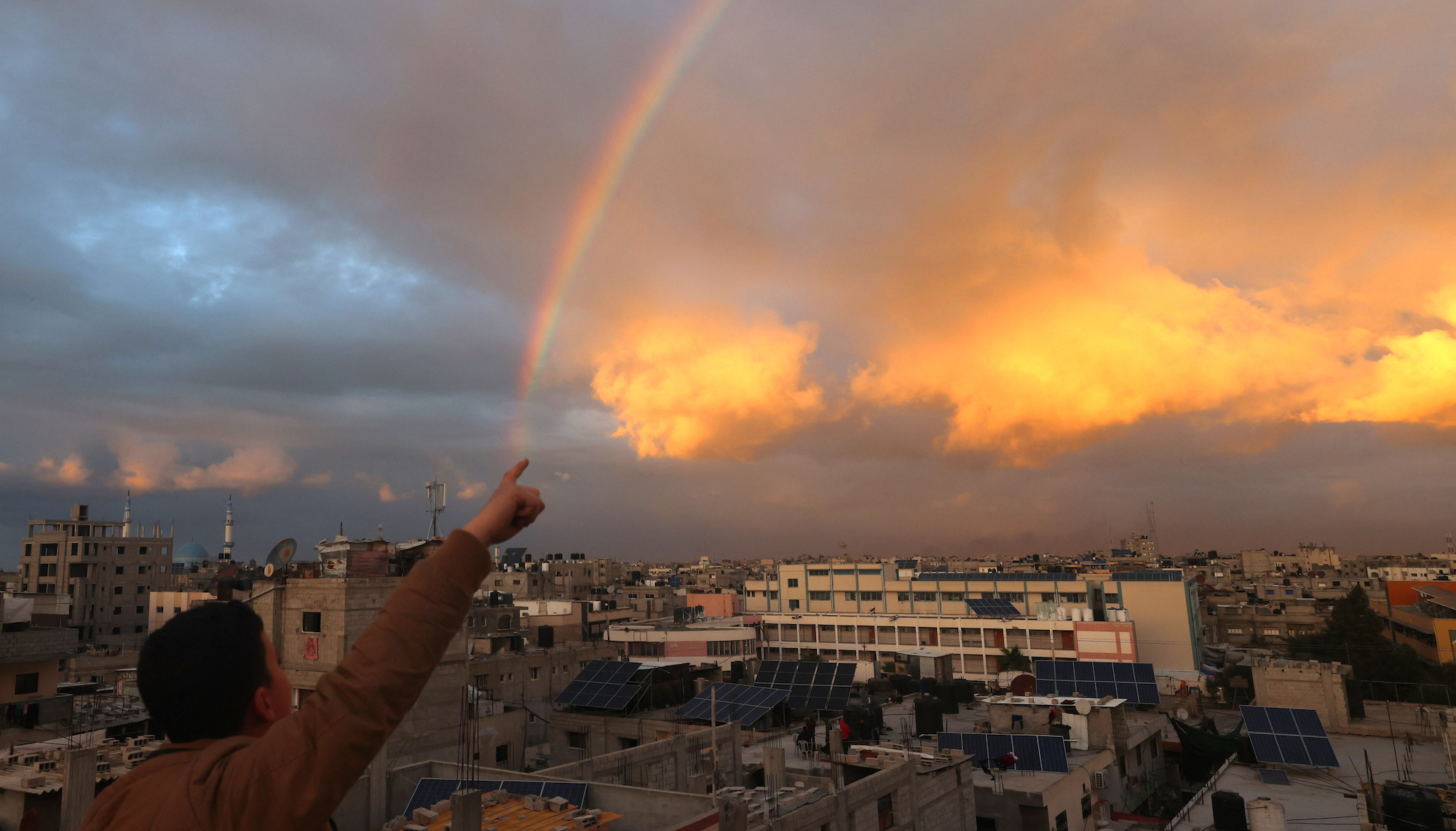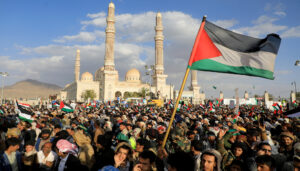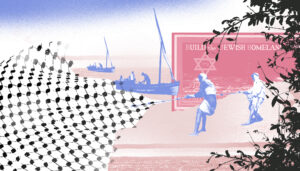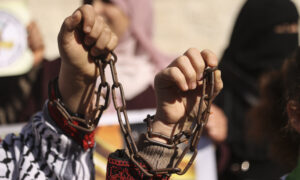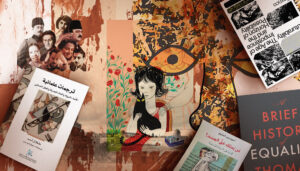Before Jinn’s first season premiered last Thursday, expectations were not particularly high. Since Netflix began cozying up to the Arab audience with productions, the first of which was Lebanese comedian Adel Karam’s contemptible show, the nature of the American network’s approach to regional production became clear. Nevertheless, on the night of the series’ premier, the accelerated reactions and eruption of controversy regarding what was considered “immoral” content surpassed the fact that Jinn is merely a mediocre artistic production that could have been simply ignored, revealing in the process our social reality.
Representing Whom?
That the series “does not represent us” was perhaps the most frequent comment in the past few days; one that invited the response that it is illogical to demand that one work of art “represent” an entire society. An example of this response appeared in the Royal Film Commission’s official statement, which indirectly defended the series while emphasizing that its content does not fall within the purview of the Commission’s duties. Though the fact that a work cannot be representative of an entire society is true, an artistic work’s natural focus on a particular group of people was transformed, in this particular context, into an exemption from critiquing the series’ basic choices (in which society do the events take place, what characters does it include, and what is the trajectory of its story) as well as its representation of a chosen group. In other words, emphasizing that the viewer may always close the web page if he did not like what he saw implicitly stated that the series merits praise from those who felt “represented” by it. Other people, then, should exercise their right to not express their opinions since the issue, simply, does not involve them.
Such an imperative of praise underscores an emphasis on the “internationalism” of this production, the significance of Netflix’s arrival into the region, and the importance of supporting young talent, regardless of any other factors. However, Netflix, and those who defended the series, pushed for supporting Jinn as the first “Arab Jordanian” work on the network. Further, the director stated that he sought to create a series that “represents teenagers from the region” and eschews “stereotypes and misrepresentations,” which appears especially contradictory to the assertion that an artistic work cannot represent an entire society.
In light of the role that cultural production plays in reinforcing or erasing certain images of “society” or its classes, and in light of power disparities between the voices of these various classes, some people’s objections that the series “does not represent them” remains valid, as long as these objections do not call for censorship or participate in attacking the series’ crew, especially its cast. Highlighting aspects of technical production to evade a critique of representation sidesteps the fact that the capacity of different social classes to “represent” their reality is one shaped by financial, social, and cultural capital through which various forms of hegemony are reproduced.
What Mediocrity Means
Whether the series represented all of us or represented only some us, Jinn performed badly. It is safe to assume that any speaker of Arabic who uses any Levantine accent would cringe when they hear the weak dialogue. It is easy to recognize, even without turning the English subtitles on, that the script is translated and ill-conceived. So we find ourselves asking, “who talks like that?” without denying the plurality of accents and manners of speech in any society.
The weakness of the dialogue is not surprising considering that the script was indeed written in English and then translated. Its three cowriters, the Lebanese Mir-Jean Bou Chaaya and the American brothers Elan and Rajeev Dassani, are not Jordanian and clearly did not do any research to bring the series closer to a local reality. Except in its lower quality, the series does not differ in its basic elements from any other American Netflix production in which teenage heroes confront supernatural powers. Its weakness was covered over by beautiful cinematography, partially through exploiting Petra’s scenery, and advanced visual and sound effects. Perhaps this visual quality is the least we can expect from a network whose profits amounted to almost 16 billion U.S. dollars last year.
The misunderstanding of the local context, or the lack of contextualization in building plot, appears in various places in the series. The story remains superficial; it does not benefit from jinn-related popular tales, which could have been rich material were the creators interested in understanding the roles of jinn in such narratives. Moreover, the series is built around characters that are not developed adequately and intentionally: it does not communicate why the characters behave in certain ways, make their decisions, or change their stances. For example, the character of Zuheir (the stepfather of Yaseen, a student who appears poorer than his classmates) is a lazy stereotype: aggressive and violent, he forbids his wife from working, does not take care of his stepson’s school fees, and is controlling and domineering. The series’ attempt to culturally stereotype him as a poor man is also incongruent with the depiction of his family’s lifestyle, which appears more middle-class.
In many places in the series, we can glimpse this alienation from even the simplest elements of the local context in which the series operates. We see, for example, a number of actors transforming their pronunciations of qafs (q) into hamzas (a), and at times even pronouncing their qafs (q)as an Egyptian geem (g). One Bedouin character speaks in the accent of some Amman residents, turning his qaf (q) into a hamza (a). Another Bedouin appears as an Ammani teenager after he is possessed by a jinn, and it is unclear how his jinn-possession is related to stripping him of bedouinism, unless the jinn is “Ammani” as well.
These problems in the quality of the work, the series’ (perhaps unintentional) depiction of social class disparity in Jordan, as well as Netflix’s response to the controversy made a lot of people feel that they were being patronized by how easily such shoddy production is offered, creating a chasm between the work and its audience. This, however, does not change the fact that the anger directed at the cast communicated an exclusionary rhetoric—in a futile moralistic battle—that sought to preserve an authoritarian singular image of what we should appear like, do, and say as a collective.
This anger found legitimation in the official responses of the Public Prosecutor, General Iftaa’ Department, Committee of National Administration and Media, and Petra Regional Authority. Almost each local entity that contributed to producing the series by offering facilities or approvals to its crew, and even entities mentioned in the credits, issued statements distancing themselves from the series or calling for holding the series accountable. These entities fanned the flames of popular opposition, painting the series as a threat to Jordanian society and its “morals, traditions, and customs.” They further called for banning it, which is ironic if we consider that local censorship mechanisms do not extend to internet broadcasting networks.
A Singular Society and Multiple Authorities
Yet again, the objection to the series by depicting it as against “our traditions and customs” produces a false conception of society as a singular, homogenous unit in lieu of understanding it as constituted by different social, religious, political, and cultural structures creating culturally distinct classes within the same country. Lifestyles, religiosity, common taste, and other such phenomena that fall under the system of traditions and customs is not identical in peasant, Bedouin, or urban societies. This also extends to the vast cultural difference among classes, in addition to individual variations within any class. The word “difference” cannot capture such distinctions in their entirety and is often utilized to impose an acceptance of an unjust reality. This does not change the fact of “difference” reaching the extent of contradiction in any society, let alone a certain social class. Repeating the narrative of the singular society with a singular culture and morality will not, in fact, render a society homogenous. Such exclusionary and non-realistic rhetoric appears more clearly when a political authority accuses its critics of being outside “our culture” and “our morals” in attempts to consecrate a “national collective” that carries “authentic morals.”
The reaction to the expletives occurring in the series is an example of this ever-changing consecration. It is self-evident that expletives have always been present in our societies, as in all others’. Expletives are in fact witnessed in the vast number of idiomatic expressions and popular narratives passed on across many years. Therefore, the problem of consecration does not merely lie in restricting morals and values to “clean” language. More importantly, the problem lies in endowing an authority, whether civil or religious, with the capacity to “sanitize” narratives, historical and contemporary, by eliding whatever does not fit into such an authority’s terms and purposes.
The other aspect of the moralistic attack on the series was related to the character of Mira, the heroine of the film, and her behavior. The fact that the attack on the cast almost exclusively targeted her can only be explained as part of a hegemonic sexist attack on women. It is characteristic of patriarchal discourse to use religion and morals to legitimate attacking women, based on the notion that they are the bearers and protectors of honor and dignity. What’s strange is that the general religious prohibition on extramarital sexual relationships is one that includes both men and women, rather than women alone. The masculine violence in scenes that depicted Yaseen and Mira’s characters being bullied and dominated never received any critique nor even mention. Also contradictory is that the sexually-inflected defamation directed at the main actress was legitimated by the emergence of moralistic discourse.
At the level of political parties, the series’ premier received ample attention from the Islamic movement in Jordan, which published many statements decrying the series and its broadcast. The Parliamentary Reformist Bloc released a statement through its spokesman in which it held the government responsible, morally and legally, for the series. The statement described the series as “foul and shameless” and “disfiguring of Jordan’s image, its people’s and authentic values’.” The Islamic Action Front also released a statement calling for “holding accountable any person who managed, funded, or supported this “despicable show.” The Council of Religious Scholars within the Muslim Brotherhood decried the series’ broadcast as a “criminal offence” that “brings forth the wrath of God” since the series included “obscene, shameless scenes opposed to the values of Islam.”
The Muslim Brotherhood often characterizes its rejection of some social practices and cultural productions as a defense against a foreign colonial invasion of our societies. Concurrently, the Brotherhood’s own rhetoric is epistemologically complicit with Orientalism, often overlapping with Orientalist discourses about our societies. Regarding “Islam” or “Society” as fixed, immutable, ahistorical things is, in its essence, an Orientalist outlook based on generalizations that facilitate labelling and stereotyping, consecrating for Arab men and women an imagined construction of fundamental and homogenous attributes. In its statements, the Brotherhood espouses such a mentality in depicting society, culture, traditions, and customs as singular, fixed entities across social differentials, based on a particular political and religious understanding.
Through such rhetoric, the Muslim Brotherhood produced a moralistic discourse that took up bodily representation and expletives as the most prominent threats to society. Such behavior, which we have witnesses in previous situations, confirms that the Brotherhood has withdrawn from political work, specifically after the Rabi’a massacre and regimes’ crackdown, and have transformed into a “behavior police” through which the organization secures from its cultural battles an illusion of political presence.
On the other hand, many have countered the attacks on the series through a selective discursive utilization of the freedom of expression. Many in the artistic community in Jordan, without realizing that creative spaces are generally related to the extent of political life’s openness, have implicitly adopted a practice of avoiding the country’s political issues, even those related to public liberties, to avoid burning bridges and ensure the continuity of their work. Therefore, some of the comments that expressed a concern that this controversy will further constrict the space for expression appeared hollow and selective, dismissing critiques which did not call for censorship nor bullied the actors. Moreover, such commentators have themselves restrained others’ opinions at times. In some cases, such commentary also reproduced stereotypical Western images, as in the response of the director, Amin Matalqa, who said that “everyone is fine with the violence and blood but not okay with language and a kiss.” Another trend was to undermine the critique of the series by calling for redirecting attention to other issues.
In any case, this does not mean that artists should become protestors or lead in protest chants. Rather, it is normal, in such a framework, to understand such selectivity as an attempt to protect categorical privileges. Freedom of expression is to be established politically at first, and political freedoms are the vessel that ensures the protection of other freedoms.

